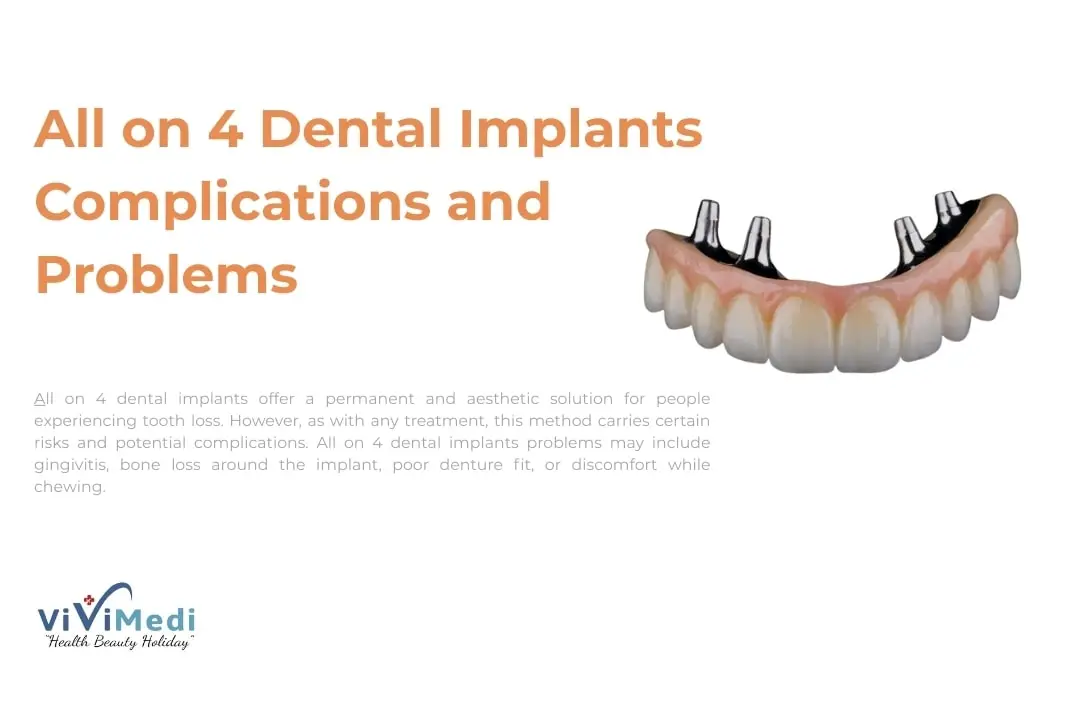All on 4 dental implants offer a permanent and aesthetic solution for people experiencing tooth loss. However, as with any treatment, this method carries certain risks and potential complications. When performed by an experienced dentist, the success rate is quite high. However, inadequate oral hygiene, surgical errors, or existing health problems can negatively impact the treatment process.

All on 4 dental implants problems may include gingivitis, bone loss around the implant, poor denture fit, or discomfort while chewing. Most of these problems can be easily resolved if detected early. Therefore, it is extremely important to attend regular dental checkups and maintain meticulous oral hygiene after implant treatment.
With proper care and professional follow-up, All on 4 implants can last for many years. Ignoring early warning signs is the most effective way to ensure the success of your treatment.
In this comprehensive guide, we will examine All on 4 implants complications and problems, advantages, and disadvantages of All on 4 dental implants, helping you make an informed decision about your dental health.
All on 4 dental implant problems
Infection
All on 4 dental implants are an effective solution for permanently replacing missing teeth. However, as with any surgical procedure, the risk of infection cannot be completely eliminated. Infection developing around the implant is generally referred to as peri-implantitis or peri-implant mucositis and can cause inflammation, swelling, and tissue loss in the gums and bone.
Infection can occur immediately after surgery or years later. Cases detected early are usually easily treated, while infections detected later can jeopardise the implant’s stability. Symptoms include a bad taste or odour, pain and bleeding around the implant, pus discharge, a feeling of loosening of the implant, and fever.
To minimise the risk, regular oral and dental care, avoiding smoking and e-cigarettes, and not missing doctor’s appointments are of great importance. In some cases, infection can be prevented with antibiotic support during or immediately before the operation. Early diagnosis and proper care ensure that your implants function healthily for many years.
Implant failure
While All on 4 dental implants have a high success rate in permanently replacing missing teeth, implant loss can occasionally occur. This typically occurs when the implant fails to fully integrate with the bone and is medically known as “implant failure.” While statistically the risk is low, it is not completely eliminated.
If failure occurs at the implant in the center of the bridge, the bridge can often be treated by preserving the bridge. However, if the implant is lost at the tip, in the terminal support area, the denture may need to be rebuilt. In such cases, dentists can develop different technical and innovative solutions to salvage the treatment.
It is not always possible to precisely determine the cause of every implant loss. However, strictly following postoperative recommendations minimizes the risk of All-on-4 implant failure. Avoiding smoking, eating a soft diet, maintaining regular oral hygiene, and attending regular dental appointments contribute to the longevity of the implant. If necessary, the failed implant can usually be repositioned and has a good chance of osseointegration on the second attempt.
Surgeon experience
All on 4 dental implants require advanced skill. Therefore, the surgeon’s experience plays a decisive role in the success of the treatment. This procedure is not taught in detail in standard dental education; therefore, it is crucial for the surgeon to have additional training and have successfully completed the procedure repeatedly.

People considering treatment may want to know that their surgeon has achieved long-term successful results. Patients with a follow-up history of 10 years or more are the strongest indicators of a doctor’s experience. Inexperience can lead to incorrect implant positioning, which can lead to negative consequences such as speech problems, aesthetic issues, or delayed healing.
Modern dental technologies, implant planning software, X-rays, and fittings can largely prevent such errors. Furthermore, problems such as fractures in bridges can be minimized with proper planning and the use of a night guard.
The most effective way to mitigate risks is to investigate the surgeon’s training and experience. Preference should be given to physicians who share testimonials on their websites, provide training at official courses and conferences, and clearly demonstrate past patient results. This significantly increases the likelihood of achieving optimal results with All-on-4 treatment.
Misalignment
All on 4 dental implants are designed to mimic the appearance and chewing function of natural teeth as much as possible. However, if you experience difficulty chewing or an unbalanced bite after treatment, this may indicate that your bite line is not positioned correctly. A misalignment is usually caused by improper implant placement or incompatibility with the size and shape of the dentures.
Misalignment can pose a problem not only for aesthetic reasons but also for oral health. Pain, discomfort, or clicking in the jaw joint, as well as noticeable changes in the symmetry of the teeth and smile, are the primary symptoms.
Early intervention can restore both the aesthetic appearance and chewing comfort of All-on-4 dental implants. Regular dental appointments ensure that such misalignment problems are identified and corrected before they progress.
Nerve damage risk
Nerve damage can occur in rare cases during All-on-4 dental implant surgery. This condition usually arises when the implant screw is placed too deep into the jaw or positioned in a way that puts pressure on the nerve. The inferior alveolar nerve in the lower jaw and the maxillary nerve in the upper jaw are particularly sensitive areas in terms of this risk.
Nerve damage in All on 4 dental implants may manifest as numbness, tingling, pain, or loss of sensation in the lips, jaw, or gums. In most cases, these effects are temporary and improve over time; however, in very rare cases, they may be permanent.
To minimise this risk, detailed X-rays and CT scans are essential for planning prior to surgery, and the surgeon’s experience and precise placement techniques are of great importance. In cases where nerve damage is detected early, appropriate treatment and follow-up can accelerate the recovery process.
Gum recession
Gum recession is the receding gums that reveal more of the tooth or its roots. This problem can occur when All-on-4 dental implants are placed incorrectly or if the implant is positioned too close to the gum line. Improper placement of the implant can also cause gum recession.
Other factors that can trigger gum recession include smoking, poor oral hygiene, existing gum disease, and habitual teeth grinding. These conditions weaken the gums around the implant and can ultimately increase the risk of implant failure.
To prevent gum recession, it’s important to ensure strong and healthy gums. In the early stages, thick and firm gums are a significant advantage. For people with genetically thin gums, gum grafting may be necessary. This treatment prevents gum thinning and provides stability around the implant.
Sinus issues
All on 4 dental implants, usually placed in the upper jaw, can cause rare complications such as sinusitis. If the implant is placed too close to or extends too far into the sinus cavity, this can lead to sinusitis. Sinusitis is most commonly seen in patients with inadequate bone support in the upper jaw.
The primary symptoms of sinusitis include facial pain, nasal congestion, mucus discharge, headaches, and toothaches. A feeling of exhaustion is also a common symptom reported by patients. To prevent such complications, it is recommended that the sinus anatomy be carefully evaluated before implant placement and, if necessary, procedures such as bone grafting or a sinus lift are performed.
Who is at risk for All on 4 implant treatment?
In All on 4 implant treatment, some individuals may encounter various difficulties during and after the treatment process.
- Firstly, jawbone adequacy is a critical factor for treatment success.
- Smokers are also at risk. Smoking negatively affects the healing process in the mouth and can complicate the implant placement process.
- On the other hand, individuals with a history of gum disease are less likely to have successful implant treatment.
- In cases where oral and dental health is not adequately cared for, the risk of infection around the implant increases, which also affects treatment success.
- Another important risk factor is individuals with chronic diseases such as diabetes. Diabetes can reduce the body’s healing capacity and lower the success rate of implants.
Considering these risk factors, proper assessment and planning before All-on-4 implant treatment is of great importance. This ensures that the treatment process is completed in a healthier and more successful manner.
Ways to avoid All on 4 dental implant problems
There are several important factors to consider in order to minimise certain difficulties encountered during the treatment process with All on 4 dental implants.
Firstly, it is extremely important to choose the right dentist and clinic to begin treatment. In addition, a comprehensive assessment must be carried out before the implant is applied. The suitability of your jawbone and your oral health ensure that the treatment process progresses smoothly.
Paying attention to oral and dental hygiene is important in order to prevent problems that may arise during the treatment process. Good oral care before and after the implant is placed reduces the risk of infection and gum disease.
If you smoke, it is recommended that you quit before the treatment process. Smoking can slow down healing and increase the risk of complications.
Also, the treatment process should be carefully managed in people with diabetes or weakened immune systems. Controlling chronic health problems speeds up healing and minimises risks.
Finally, attending regular dental appointments and carefully monitoring the healing process allows for the early detection of potential issues. This helps prevent possible complications.
Following post-operative care instructions is essential for the treatment process to progress smoothly. These precautions help ensure the best possible outcome for All-on-4 implant treatment.
Contact ViviMedi Clinic for All on 4 dental implants
All on 4 dental implants are an excellent treatment method that offers a permanent and aesthetic solution for replacing missing teeth. However, as with any procedure, some potential difficulties and complications can arise.
First, choosing an experienced dentist and a quality clinic before starting treatment is a critical step. A good dentist anticipates potential complications that may arise during the treatment process and takes the necessary steps to minimize them. Expertise plays a significant role not only in the treatment process but also in the recovery period.
A thorough preliminary evaluation is essential for the success of the implant procedure. Oral health and jawbone condition directly affect the effectiveness of the treatment. Therefore, when the treatment process is initiated with proper planning, complications can be largely prevented.
In conclusion, with proper planning and care, the results of All on 4 treatment can be quite successful. A careful and meticulous approach to treatment ensures a smooth recovery and an aesthetically pleasing smile in the long term.
If you would like to get more detailed information about All on 4 treatment in Antalya, you can schedule a free online consultation at our ViviMedi clinic or contact us by phone.


